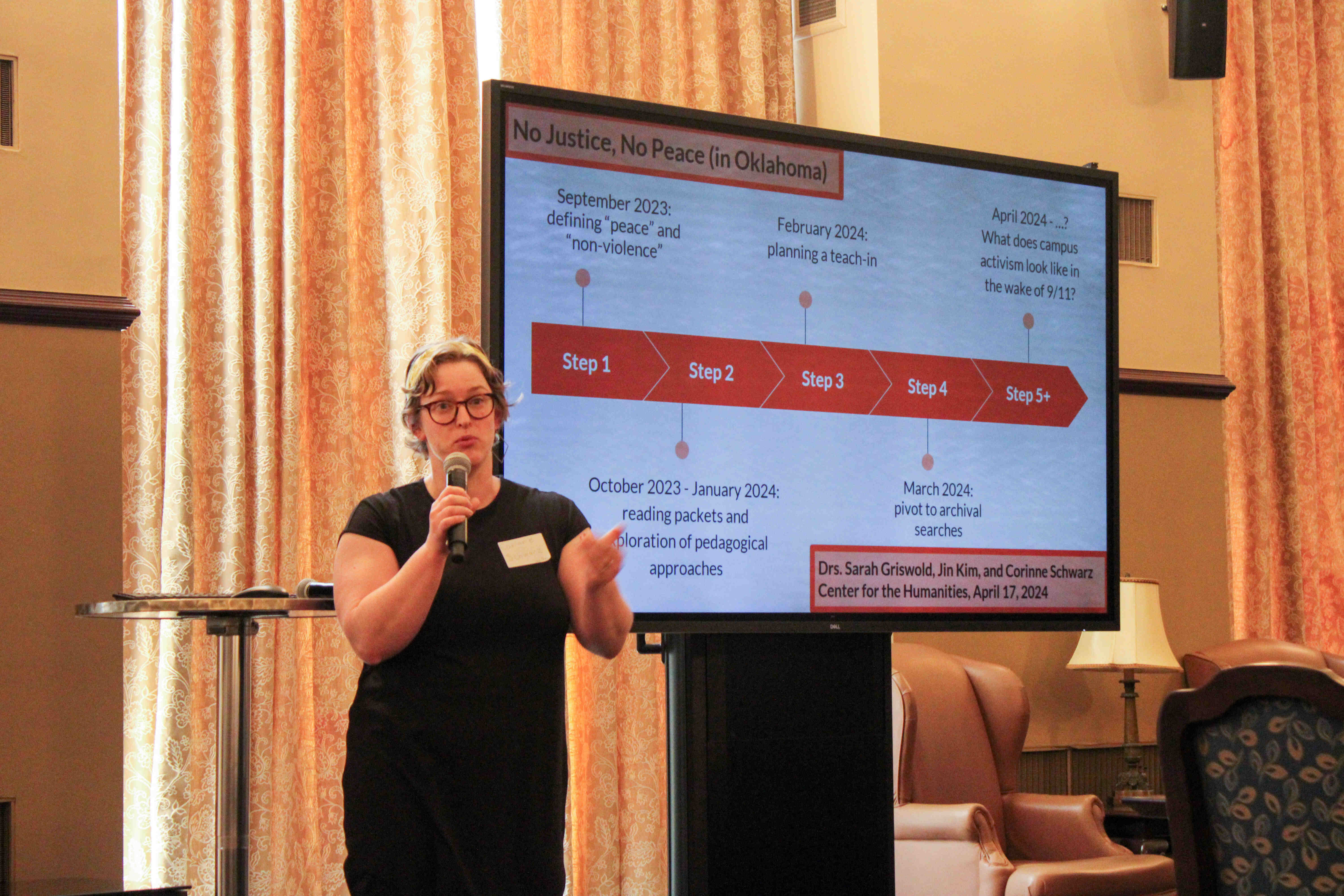Non-Violence and Peace Studies Research Group
Non-Violence and Peace Studies Members
- Dr. Sarah Griswold, History
- Dr. Corinne Schwarz, Gender, Women’s, & Sexuality Studies and Sociology
- Dr. Jin Young Kim, Religious Studies and Philosophy
OSU After 9/11: A Peacebuilding Archive of the University's Response to September 11th
With the 25th anniversary of September 11th approaching in 2026, our project seeks to create an archive of how the Oklahoma State University campus responded. Academic literature and ample press reporting at the time bear out the transformative nature of the 9/11 attacks on university campuses around the country. To our knowledge, a retrospective picture of the particular history of OSU after 9/11 does not exist. We therefore plan to establish a qualitative, multiperspectival, and restorative archive of OSU’s response in the days, months, and early years after 9/11. We approach our project informed by a Peace Studies/Peace Humanities framework.
We wish to catalog the administration’s response on the level of policies. How did 9/11, for example, lead to new security procedures on campus (if any)? Did the university change or establish new policies for accepting international students? We want to piece together how certain academic departments and institutional offices responded. What new subjects, for example, did instructors feel inspired to offer courses in, or did departments seek to hire in? Finally, we want to record student impression and experience, be that through the columns of O’Colly reporters, the experience of international students from Muslim-majority countries, or the actions of military reservists, peace activists, and civil liberties advocates amid George W. Bush’s American-led “global war on terror.” As the al-Qaeda/Afghanistan context of 9/11 came into view over Fall 2001, how did the campus community respond? What kinds of rhetoric of war and/or peace emerged? And what kinds of services, events, or dialogues developed as students, faculty, and the administration grappled with 9/11’s after-effects?
As our project developed during the 2023-2024 academic year, our core interest in how campus communities understand and respond to violence has remained of central importance. Even though we are looking back at an important historical moment, we see this archive as helping us (and our fellow campus community members) make sense of our current moment. What trends, patterns, and norms from OSU’s post-9/11 response still shape our lives on campus today? What commonalities can student activists find in their historical contemporaries’ experiences with institutional policies? In what ways have faculty and staff always been enmeshed in these student endeavors? In looking back to look forward, we are excited to learn about the ways resistance, power, and collaboration have always shaped the on-campus ecosystem.
Next Steps
We will build our OSU After 9/11 archive over AY 2024-2025 by drawing from and juxtaposing three kinds of source pillars. The first pillar–campus media of the period–will be an expansion of the preliminary project work we accomplished in AY 2023-2024. To date, we have reviewed over 100 relevant newspaper articles from the O’Colly student newspaper and begun to create a digital archive of OSU’s response to 9/11 as per its coverage in the campus paper. This pillar of our archive provides a view of events in medias res, while also generating useful leads for us, including the names of relevant administrators, engaged professors, student groups, and student-reporters, to help us initialize the second pillar of our archive.
Our archive’s second pillar will comprise oral history interviews, which we will conduct beginning AY 2024-2025 among a representative range of people active on the OSU campus after 9/11. By parsing the O’Colly, taking word-of-mouth references, and posting an open call asking for participants, we hope to identify and interview up to 8 oral history subjects in AY 2024-2025, with a similar figure to follow in AY 2025-2026. We will work with the Oklahoma Oral History Research Program (OOHRP) to ensure that our process complies with OOHRP guidelines and best practice. By 2026, we hope to have created up to 16 oral history interviews to register as a collection with the OOHRP.
Finally, a third pillar will involve the university’s own administrative records, which will provide insights often unavailable to student newspaper reporters and revelations that might remain elusive via oral history. Through collaboration with the OSU University Archives, our main objective will be the compilation of a “9/11 Finding Aid” in service to institutional history and to future researchers. We expect this third pillar’s work to be carried out in AY 2025-2026.
List of Anticipated Deliverables
- Application to OSU’s AURCA program for an AURCA student intern in 2024-2025
- Archive Pillar 1: 9/11 O’Colly Archive (ongoing in AY 2024-2025 and AY 2025-2026)
- Archive Pillar 2: 9/11 Oral History Archive w/OOHRP (ongoing AY 24-25 & AY 25-26)
- Archive Pillar 3: 9/11 University Archives Finding Aid (ongoing in AY 2025-2026)
- An online platform via OSU that unites all 3 Archive Pillars for researchers’ use
- Public Event in September 2026 timed with the 25th anniversary of September 11th
- “Traditional” academic deliverable(s) in the form of article(s) for specific peer-reviewed journals (ex., American Studies, Journal of Peace Education, Journal of Peace Research, Memory Studies, The Oral History Review) and/or CFPs relevant to anniversary of September 11th
Contact Details:
To contribute to the OSU After 9/11 Archive write tosarah.griswold@okstate.edu; jinkim@okstate.edu; and corinne.schwarz@okstate.edu

